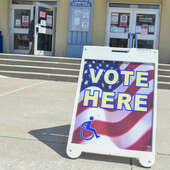More to explore
-
 Local News 8/14/24Kids who survived KC Super Bowl shooting are scared, suffering panic attacks and sleep problemsSix months after Gabriella Magers-Darger’s legs were burned by sparks from a ricocheted bullet at the Kansas City Chiefs Super Bowl parade in February, the 14-year-old is ready to leave the past behind. She is dreading the pitfalls of being a high...
Local News 8/14/24Kids who survived KC Super Bowl shooting are scared, suffering panic attacks and sleep problemsSix months after Gabriella Magers-Darger’s legs were burned by sparks from a ricocheted bullet at the Kansas City Chiefs Super Bowl parade in February, the 14-year-old is ready to leave the past behind. She is dreading the pitfalls of being a high... -
 Local News 8/14/24Missouri voters will decide whether to legalize abortion in NovemberAbortion will be on Missouri’s statewide ballot in November. An initiative petition to enshrine the right to abortion up until the point of fetal viability received final approval Tuesday, securing a place on the general election ballot. If the...
Local News 8/14/24Missouri voters will decide whether to legalize abortion in NovemberAbortion will be on Missouri’s statewide ballot in November. An initiative petition to enshrine the right to abortion up until the point of fetal viability received final approval Tuesday, securing a place on the general election ballot. If the... -

-

-

-

-

-

-
 Local News 8/13/24Hawley rallies supporters with critique of opponent Kunce at Scott City campaign event23U.S. Sen. Josh Hawley spoke to dozens in attendance during a campaign stop Monday, Aug. 12, at Westrich Farms on Nash Road in Scott City, where he primarily focused on Lucas Kunce, his opponent in the upcoming general election. ...
Local News 8/13/24Hawley rallies supporters with critique of opponent Kunce at Scott City campaign event23U.S. Sen. Josh Hawley spoke to dozens in attendance during a campaign stop Monday, Aug. 12, at Westrich Farms on Nash Road in Scott City, where he primarily focused on Lucas Kunce, his opponent in the upcoming general election. ... -
 Local News 8/13/24Planned power outage to affect subdivisions of Trail Ridge, Eastridge Place in JacksonWork to replace defective power equipment will result in a planned power outage affecting Trail Ridge and Eastridge Place subdivision residents from 8:30 a.m. to noon Tuesday, Aug. 13, in Jackson. ...
Local News 8/13/24Planned power outage to affect subdivisions of Trail Ridge, Eastridge Place in JacksonWork to replace defective power equipment will result in a planned power outage affecting Trail Ridge and Eastridge Place subdivision residents from 8:30 a.m. to noon Tuesday, Aug. 13, in Jackson. ... -

-

-

-

-

-
 Local News 8/12/24Winners of Cape County’s primary races discuss reactions and plans for officeFour Cape Girardeau County Republican candidates won contested races during the primary election Tuesday, Aug. 6. Three will run unopposed in November, while one will continue to campaign ahead of the general election. ...
Local News 8/12/24Winners of Cape County’s primary races discuss reactions and plans for officeFour Cape Girardeau County Republican candidates won contested races during the primary election Tuesday, Aug. 6. Three will run unopposed in November, while one will continue to campaign ahead of the general election. ... -
 Local News 8/12/24Cape County History Center to hold concert of traditional musicMike Compton and Joe Newberry will be coming to Jackson on Thursday, Aug. 15. They will be bringing their blend of traditional and new American music to a concert at the Cape Girardeau County History Center, 102 High St. ...
Local News 8/12/24Cape County History Center to hold concert of traditional musicMike Compton and Joe Newberry will be coming to Jackson on Thursday, Aug. 15. They will be bringing their blend of traditional and new American music to a concert at the Cape Girardeau County History Center, 102 High St. ... -
 Local News 8/12/24Dunklin County election re-count slated for MondayKENNETT — Dunklin County Clerk Kent Hampton on Thursday, Aug. 8, said voting irregularities that occurred in the election Tuesday, Aug. 6, forced a re-count slated for Monday, Aug. 12, at his offices at the Dunklin County Courthouse. Hampton...
Local News 8/12/24Dunklin County election re-count slated for MondayKENNETT — Dunklin County Clerk Kent Hampton on Thursday, Aug. 8, said voting irregularities that occurred in the election Tuesday, Aug. 6, forced a re-count slated for Monday, Aug. 12, at his offices at the Dunklin County Courthouse. Hampton... -

-

-

-
 Local News 8/9/24Voter turnout rises in Cape Girardeau, Perry and Scott Counties since 2022 but falls short of 2020 numbersCape Girardeau, Perry and Scott Counties saw an increase in overall voter turnout compared to the 2022 primary election, but numbers were down compared to 2020. There were 29,572 voters out of 93,500 ballots cast on Tuesday for a turnout of 31.62%...
Local News 8/9/24Voter turnout rises in Cape Girardeau, Perry and Scott Counties since 2022 but falls short of 2020 numbersCape Girardeau, Perry and Scott Counties saw an increase in overall voter turnout compared to the 2022 primary election, but numbers were down compared to 2020. There were 29,572 voters out of 93,500 ballots cast on Tuesday for a turnout of 31.62%... -
 Local News 8/9/24Perry County primary winners point to goalsIncumbent Perry County associate commissioners Keith Hoehn and Jay Wengert won their contested Republican primary races on Tuesday to keep their seats on the commission as both candidates will run uncontested in November's general election. Hoehn, a...
Local News 8/9/24Perry County primary winners point to goalsIncumbent Perry County associate commissioners Keith Hoehn and Jay Wengert won their contested Republican primary races on Tuesday to keep their seats on the commission as both candidates will run uncontested in November's general election. Hoehn, a... -

-
 Local News 8/9/24SEMO, Cape Girardeau Public Schools join forces to enhance education, cultural experiences for staff7Southeast Missouri State University and Cape Girardeau Public Schools officials signed an agreement Thursday, Aug. 8, to enter into an exclusive partnership aiming to increase access for district employees to SEMO’s educational programs, cultural...
Local News 8/9/24SEMO, Cape Girardeau Public Schools join forces to enhance education, cultural experiences for staff7Southeast Missouri State University and Cape Girardeau Public Schools officials signed an agreement Thursday, Aug. 8, to enter into an exclusive partnership aiming to increase access for district employees to SEMO’s educational programs, cultural... -

-

-
 Most read 8/8/24Cape council expands bow hunts of deer to private properties of minimum of 2-acres16Cape Girardeau City Council members Monday, Aug. 5, approved expanding deer hunts using archery equipment to private properties of a minimum of 2 acres. During the council’s meeting, police officer Ty Metzger said that to reduce property damage and...
Most read 8/8/24Cape council expands bow hunts of deer to private properties of minimum of 2-acres16Cape Girardeau City Council members Monday, Aug. 5, approved expanding deer hunts using archery equipment to private properties of a minimum of 2 acres. During the council’s meeting, police officer Ty Metzger said that to reduce property damage and... -
 Most read 8/8/24Former Notre Dame student serves as Missouri’s page at RNCNotre Dame Regional High School graduate and current Mississippi State University student Elise Edwards, 20, received the opportunity of a lifetime to serve as a page at the recent 2024 Republican National Convention in Milwaukee. Edwards, who is...
Most read 8/8/24Former Notre Dame student serves as Missouri’s page at RNCNotre Dame Regional High School graduate and current Mississippi State University student Elise Edwards, 20, received the opportunity of a lifetime to serve as a page at the recent 2024 Republican National Convention in Milwaukee. Edwards, who is... -
 Most read 8/8/24Body found in Mississippi River ID’d as missing woman1A body found Sunday, Aug. 4, in the Mississippi River in Mississippi County has been identified as missing person Rose Mary Weaver, last seen July 30 in Cape Girardeau. According to Mississippi County Coroner Terry Parker, Weaver’s body was found in...
Most read 8/8/24Body found in Mississippi River ID’d as missing woman1A body found Sunday, Aug. 4, in the Mississippi River in Mississippi County has been identified as missing person Rose Mary Weaver, last seen July 30 in Cape Girardeau. According to Mississippi County Coroner Terry Parker, Weaver’s body was found in... -

-



Respond to this story
Posting a comment requires a subscription.